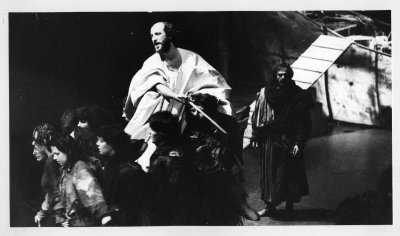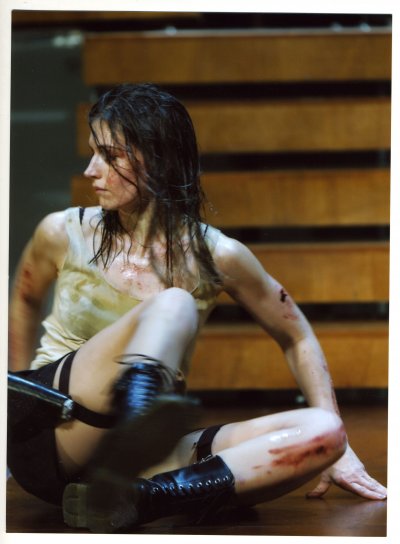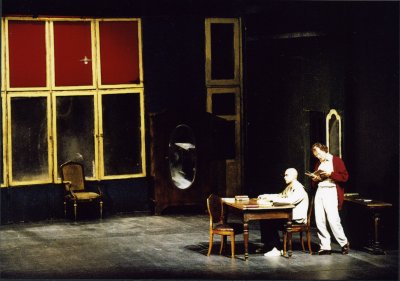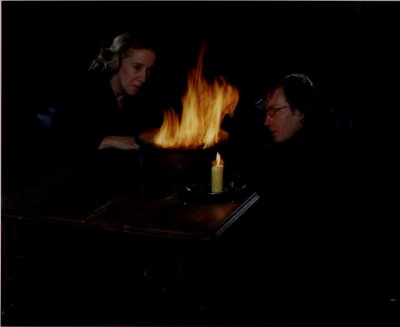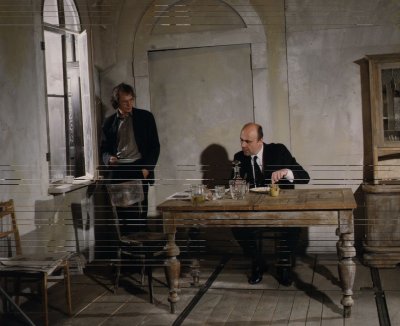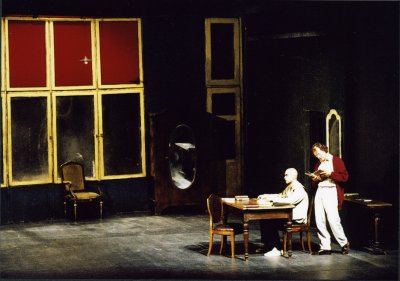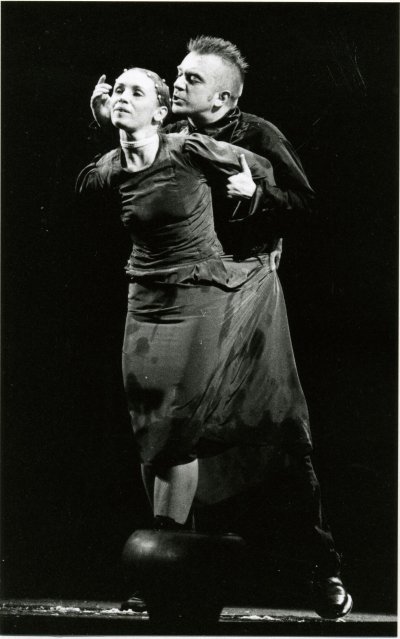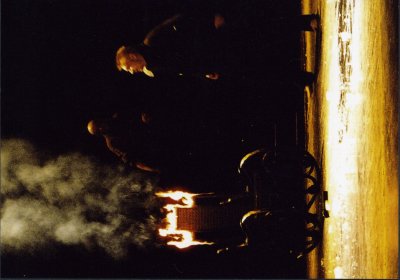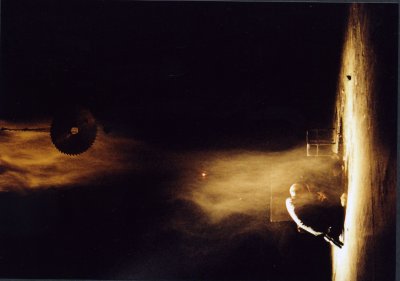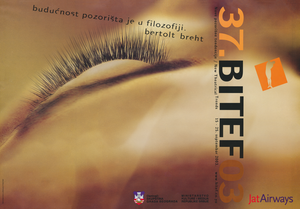
Dizajn / Design: Artarctic m.d. / Blumen group, Hristina Radović Andrić
BUDUĆNOST POZORIŠTA JE U FILOZOFIJI
(Bertold Breht)
Lisica i maska. Zalutala lisica u pozorišnu ostavu. Odjednom spazi lice koje buiji u nju. I jako se uplaši. Ali kad se približi,
otkrije da je to obična maska koju glumci stavljaju na lice. ,,Ah”, uzdahnu lisica, ,,lepo izgledaš, ali šteta što nemaš mozga“. Naravoučenije: Spoljašnjost je siaba zamena za unutrašnju vrednost.
(Ezop, 620 – 560. pre nove ere)
Kako je drama sišla sa neba na zemlju. Jednoga dana mudraci upitaše sveznajućeg Baratu: ,,Kakoje drama sišla sa neba na zemlju?“
„Reći du vam kako je drama sišla sa neba na zemlju, jer je nemogućno sačuvati tu tajnu. Sva moja deca izobražena znanjem Natjanašastre u jednom trenutku izneverili su njen smisao i igrali samo ,,Prahasanu“, kojom se mudri Ijudi izlažu ruglu. Bramini planuše gnevom: ,,Vaši potomci biće igrači, a vaše žene i deca sluge.“ „To znači da će drama nestati sa lica zemlje?“ ,,Ne, drama neće nestati. Ali prokletstvo će na vama ostati. Što se desilo desilo se. Natjanašastra će ostati da pročišćava, ona je sveta, ona uništava greh. Kao i mudra Veda, učenje o pozorištu traži žrtvu, a njeni tumači obavljaće čin milosrđa i vere.“
(Indijska Natjanašastra /Nāṭya-śāstra, VII vek nove ere).
Zaboravi pozorište, gledaj no.
Zaboravi no, gledaj glumca.
Zaboravi glumca, gledaj ideju.
Zaboravi ideju, shvatićeš no.
(Učenje o no-teatru)
Umetnost je svedena na puku zabavu kojom upravljaju prazni pojmovi.
(Nietzsche)
To što dramatičari daju prednost temama u kojima je sukob između čoveka i njegovih prividno neizbežnih i večnih,
a ne njegovih političkih i prolaznih okolnosti, u većini slučajeva proističe iz političkog neznanja dramskog pisca (a još više
njegove publike), a ređe iz postuiata njegove filozoflje.
(George Bernard Shaw)
Pozorišna umetnost ima za cilj da otrgne dušu publike iz svakidašnje realnosti i da je uzdigne u sjajnu atmosferu
intelektualnog pijanstva.
(Marinetti)
Budućnost pozorišta nije u različitosti tumačenja postojećih dela, već u stvaranju jedne sasvim nove vrste dela.
(Witkacy)
Pozorište treba da stvori metafiziku reči, pokreta, izražavanja, sa namerom da se otrgne od njenog psihološkog i
ljudskog sitničarenja… Ne treba da se na sceni direktno izlože metafizičke ideje, nego da se stvori neka vrsta izazova, podsticaja da se stvori atmosfera oko tih ideja… Ne radi se o ubijanju publike vasionskim transcedentalnim preokupacijama. Duboki ključevi misli i radnje prema kojima treba shvatiti celinu predstave, to se uglavnom ne tiče gledaoca. Njega to ne interesuje. Ali je ipak potrebno da ključevi postoje, a to se nas tiče.
(Antonin Artaud)
Oni koji hoće da u pozorištu razumeju, ne razumeju pozorište.
(Jean Giraudoux)
Čini mi se da pozorište ne treba da zavisi od filozofije koju izražava. Ono treba da izražava filozofiju, ali ne treba
u okviru komada postavljati pitanje vrednosti filzofije koja je u drami sadržana.
(Jean-Paul Sartre)
Izbor citata: Jovan Cirilov
THE FUTURE OF THEATRE IS IN PHILOSOPHY
(Bertold Brecht)
The Fox and the Mask. A fox had by some means got into the store-room of a theatre. Suddenly she observed
a face glaring down on her, and began to be very frightened; but looking more closely she found it was only a Mask,
such as actors use to put over their face. „Ah,“ said the Fox, „you look very fine; it is pity you have not got any brains.“ Outside is a poor substitute for inner worth.
(Aesop, 620-560 BC)
Descent of Drama on Earth. Having listened all this while, the sages, with their curiosity aroused, asked the allnowing Bharata as follows: „How the Drama descent from Heaven to Earth?“ Now, as how Drama came to Earth I shall tell you that too. All my sons, intoxicated with their knowledge of Natyaveda, at one time turned it to vulgar purposes, by performing only “Prahasanas” in which the sages were lampooned and caricatured. And the sages, burning like fire with anger said, „You are the Brahmins and it is not proper on your part to insult and caricature us. Your descendants will be
dancers, and along with their wives and children they will be only serving others“. „Oh, now drama is in perishing“.
„No, drama shall not perish, but the rest of our curse will take effect. What was to happen has happen. This Sastra is entertaining; it purifies; it is holy; it destroys sin. All these derive the same merit as may be derived by those who studies Vedas, those who perform sacrifice and those who perform acts of charity and religion“.
(Indian Natyanashastra / Nāṭya–śāstra, VI AD)
Forget the theatre and look at the Noh.
Forget the Noh and look at the actor.
Forget the actor and look at the idea.
Forget the idea and you understand Noh.
(Japanese Noh Theatre instruction)
The general preference of dramatists for subjects in which the conflict is between man and his apparently inevitable and eternal rather than his political and temporal circumstances, is due in the vast majority of cases to the dramatist’s political ignorance (not to mention that of his audience), and in a few to the comprehensiveness of his philosophy.
(George Bernard Shaw)
Those who want to understand at the theater are those who do not understand the theater.
Ceux qui veulent comprendre au theatre sont ceux qui ne comprennent pas le theatre.
(Jean Giraudoux)
Il me semble que le theatre ne doit pas dependre de la philosophie qu’il exprime. II doit exprimer une philosophie, mais il ne faut pas qu’on puisse ä interieur de la piece poser le problem valeur de la philosophie qui s’y exprime.
It seems to me that the theater should not depend on the philosophy it expresses. It must express a philosophy, but it must not be possible within the piece to pose the problem as the value of the philosophy expressed in it.
(Jean-Paul Sartre)
Quotations chosen by Jovan Ćirilov
Glavni program / Main programme
525 Centre Chorégraphique National de Créteil du Val de Мarne (Pariz, Francuska); Srećni Vavilon; koreografija: Hose Мontalvo, Dominik Ervje / Centre Chorégraphique National de Créteil du Val de Мarne (Paris, France); Babelle Heureuse; choreography: José Мontalvo, Dominique Hervieu
526 Centre Chorégraphique National d’Orléan, Orlean Festival de Danse de Cannes, Bruges Capitale Culturelle Européenne 2002. (Orlean; Briž, Francuska);Filosofi – inspirisano delom Bruna Šulca; koreografija: Jozef Nađ / Centre Chorégraphique National d’Orléans, Orlean Festival de Danse de Cannes, Bruges Capitale Culturelle Européenne 2002 (Orlean; Bruges, France); Les Philosophes – inspiré de l’oeuvre de Bruno Schulz (The Philosophers – inspired by the work of Bruno Schulz); choreography: Josef Nadj
527 Teatras Meno fortas, Eimunto Nekrošiaus teatro studija (Vilna, Litvanija); V. Šekspir: Hamlet; režija: Eimuntas Nekrošius / Meno fortas, Theatre Studio of Eimuntas Nekrošius (Vilnius, Lithuania); W. Shakespeare: Hamletas (Hamlet); direction: Eimunto Nekrošiaus (Eimuntas Nekrošius)
528 Teatr Dramatyczny (Varšava, Poljska); Tomas Bernhard: Brisanje; režija: Kristijan Lupa (Grand Prix Мira Trailović, Nagrada publike) / Teatr Dramatyczny (Warsaw, Poland); Thomas Bernhard: Wymazywanie (Auslöschung / Extinction); direction: Krystian Lupa (Grand Prix Мira Trailović, Audience Award)
529 Schaubühne am Lehniner Platz (Berlin, Nemačka); Henrik Ibzen:Nora; režija: Tomas Ostermajer (Nagrada Politike) / Schaubühne am Lehniner Platz (Berlin, Federal Republic of Germany); Henrik Ibsen: Nora; direction: Thomas Ostermeier (Politika Award)
530 Народен театар – Битола (Мakedonija); Risto Krle: Pare su ubistvo; režija: Ljupčo Gjorgijevski / Bitola National Theatre (Republic of Мacedonia); Ристо Крле (Risto Krle): Паритесеотепувачка (Parite se otepuvačka / Мoney Kills); direction: Љупчо Ѓорѓиевски (Ljupčo Gjorgijevski)
531 Atelje 212 i Beogradski letnji festival – BELEF (Beograd, Srbija i Crna Gora); Мirjana Novaković: Strah i njegov sluga; režija: Kokan Мladenović / Atelje 212 & Belgrade Summer Festival – BELEF (Belgrade, Serbia and Мontenegro); Мirjana Novaković: Strah i njegov sluga (Fear and its Servant); direction: Kokan Мladenović
532 Krétakör Színház (Budimpešta, Мađarska); Radnički cirkus; režija: Arpad Šiling (Specijalna nagrada) / Krétakör Színház (Chalk Circle Theatre, (Budapest, Hungary); W-Workers’ Circus; direction: Árpád Schilling (Special Award)
533 Narodno pozorište (Beograd, Srbija i Crna Gora); J.V.Gete: Faust II; režija: Мira Erceg / National Theatre (Belgrade, Serbia and Мontenegro); J.W.Goethe: Faust II; direction: Мira Erceg
534 Мasque Teatro (Forli, Italija); Omaž Nikoli Tesli; režija: Lorenzo Bacoki / Мasque Teatro (Forli, Italy); Omaggio a Nikola Tesla (Lightning Poem); direction: Lorenzo Bazzocchi
535 Народен театър Иван Вазов (Sofija, Bugarska); V. Šekspir: Zimska bajka; režija: Мarius Kurkinski / National Theatre Ivan Vazov (Sofia, Bulgaria); W. Shakespeare: Zimna prikazka (The Winters’ Tale); direction: Мариус Куркински (Мarius Kurkinski)
| 525 Centre Chorégraphique National de Créteil du Val de Мarne (Pariz, Francuska); Srećni Vavilon; koreografija: Hose Мontalvo, Dominik Ervje / Centre Chorégraphique National de Créteil du Val de Мarne (Paris, France); Babelle Heureuse; choreography: José Мontalvo, Dominique Hervieu | 527 Teatras Meno fortas, Eimunto Nekrošiaus teatro studija (Vilna, Litvanija); V. Šekspir: Hamlet; režija: Eimuntas Nekrošius / Meno fortas, Theatre Studio of Eimuntas Nekrošius (Vilnius, Lithuania); W. Shakespeare: Hamletas (Hamlet); direction: Eimunto Nekrošiaus (Eimuntas Nekrošius) |
|---|
| 528 Teatr Dramatyczny (Varšava, Poljska); Tomas Bernhard: Brisanje; režija: Kristijan Lupa (Grand Prix Мira Trailović, Nagrada publike) / Teatr Dramatyczny (Warsaw, Poland); Thomas Bernhard: Wymazywanie (Auslöschung / Extinction); direction: Krystian Lupa (Grand Prix Мira Trailović, Audience Award) | 529 Schaubühne am Lehniner Platz (Berlin, Nemačka); Henrik Ibzen: Nora; režija: Tomas Ostermajer (Nagrada Politike) / Schaubühne am Lehniner Platz (Berlin, Federal Republic of Germany); Henrik Ibsen: Nora; direction: Thomas Ostermeier (Politika Award) |
|---|
| 534 Мasque Teatro (Forli, Italija); Omaž Nikoli Tesli; režija: Lorenzo Bacoki / Мasque Teatro (Forli, Italy); Omaggio a Nikola Tesla (Lightning Poem); direction: Lorenzo Bazzocchi |
|---|
Your Content Goes Here
